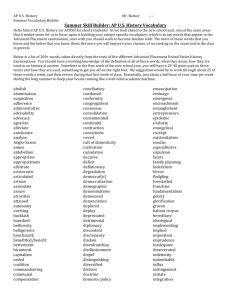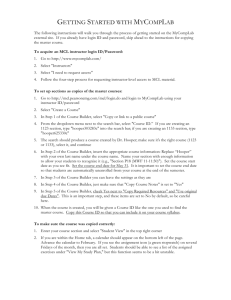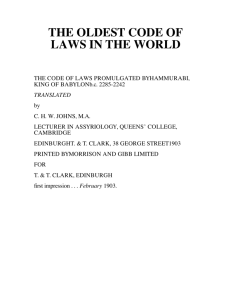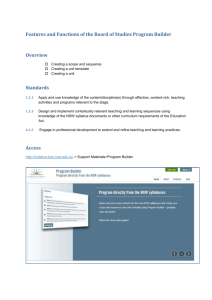home warranty insurance policy for residential building work
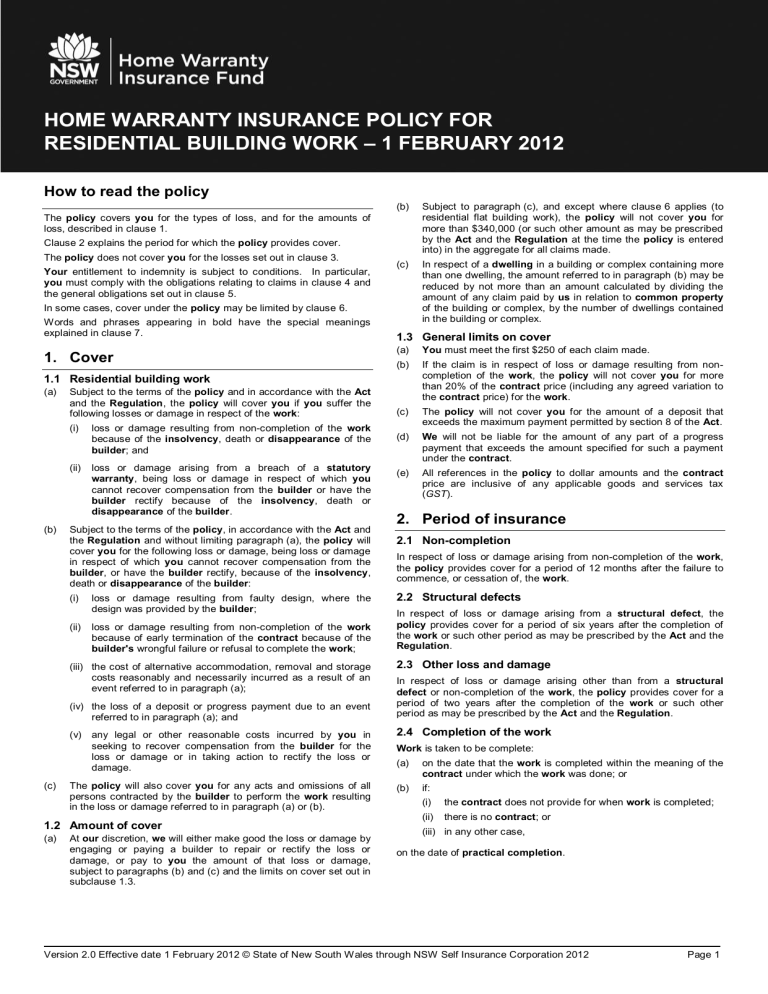
HOME WARRANTY INSURANCE POLICY FOR
RESIDENTIAL BUILDING WORK
– 1 FEBRUARY 2012
How to read the policy
The policy covers you for the types of loss, and for the amounts of
Clause 2 explains the period for which the
policy provides cover.
The policy does not cover you
for the losses set out in clause 3.
Your entitlement to indemnity is subject to conditions. In particular, you
must comply with the obligations relating to claims in clause 4 and
the general obligations set out in clause 5.
In some cases, cover under the policy
Words and phrases appearing in bold have the special meanings
1. Cover
1.1 Residential building work
(a) Subject to the terms of the policy and in accordance with the Act and the Regulation , the policy will cover you if you suffer the following losses or damage in respect of the work :
(i) loss or damage resulting from non-completion of the work because of the insolvency , death or disappearance of the builder ; and
(ii) loss or damage arising from a breach of a statutory warranty , being loss or damage in respect of which you cannot recover compensation from the builder or have the builder rectify because of the insolvency , death or disappearance of the builder .
(b) Subject to the terms of the policy , in accordance with the Act and the Regulation and without limiting paragraph (a), the policy will cover you for the following loss or damage, being loss or damage in respect of which you cannot recover compensation from the builder , or have the builder rectify, because of the insolvency , death or disappearance of the builder :
(i) loss or damage resulting from faulty design, where the design was provided by the builder ;
(ii) loss or damage resulting from non-completion of the work because of early termination of the contract because of the builder's wrongful failure or refusal to complete the work ;
(iii) the cost of alternative accommodation, removal and storage costs reasonably and necessarily incurred as a result of an event referred to in paragraph (a);
(iv) the loss of a deposit or progress payment due to an event referred to in paragraph (a); and
(v) any legal or other reasonable costs incurred by you in seeking to recover compensation from the builder for the loss or damage or in taking action to rectify the loss or damage.
(c) The policy will also cover you for any acts and omissions of all persons contracted by the builder to perform the work resulting in the loss or damage referred to in paragraph (a) or (b).
1.2 Amount of cover
(a) At our discretion, we will either make good the loss or damage by engaging or paying a builder to repair or rectify the loss or damage, or pay to you the amount of that loss or damage, subject to paragraphs (b) and (c) and the limits on cover set out in
(b)
Subject to paragraph (c), and except where clause 6 applies (to
residential flat building work), the policy will not cover you for more than $340,000 (or such other amount as may be prescribed by the Act and the Regulation at the time the policy is entered into) in the aggregate for all claims made.
(c) In respect of a dwelling in a building or complex containing more than one dwelling, the amount referred to in paragraph (b) may be reduced by not more than an amount calculated by dividing the amount of any claim paid by us in relation to common property of the building or complex, by the number of dwellings contained in the building or complex.
1.3 General limits on cover
(a) You must meet the first $250 of each claim made.
(b) If the claim is in respect of loss or damage resulting from noncompletion of the work , the policy will not cover you for more than 20% of the contract price (including any agreed variation to the contract price) for the work .
(c) The policy will not cover you for the amount of a deposit that exceeds the maximum payment permitted by section 8 of the Act .
(d) We will not be liable for the amount of any part of a progress payment that exceeds the amount specified for such a payment under the contract .
(e) All references in the policy to dollar amounts and the contract price are inclusive of any applicable goods and services tax
( GST ).
2. Period of insurance
2.1 Non-completion
In respect of loss or damage arising from non-completion of the work , the policy provides cover for a period of 12 months after the failure to commence, or cessation of, the work .
2.2 Structural defects
In respect of loss or damage arising from a structural defect , the policy provides cover for a period of six years after the completion of the work or such other period as may be prescribed by the Act and the
Regulation .
2.3 Other loss and damage
In respect of loss or damage arising other than from a structural defect or non-completion of the work , the policy provides cover for a period of two years after the completion of the work or such other period as may be prescribed by the Act and the Regulation .
2.4 Completion of the work
Work is taken to be complete:
(a) on the date that the work is completed within the meaning of the contract under which the work was done; or
(b) if:
(i) the contract does not provide for when work is completed;
(ii) there is no contract ; or
(iii) in any other case, on the date of practical completion .
Version 2.0 Effective date 1 February 2012 © State of New South Wales through NSW Self Insurance Corporation 2012 Page 1
3. Loss and damage for which the policy provides no cover
The policy will not cover you for:
(a) claims that may otherwise arise under the contract in the nature of liquidated damages for delay or damages for delay, however this limitation does not extend to any increase in rectification costs caused by the effluxion of time;
(b) a claim for loss or damage resulting from any of the following:
(i) war;
(ii) an act of terrorism ;
(iii) civil unrest;
(iv) a nuclear event;
(v) failure by you to maintain appropriate protection against pest infestation or exposure of natural timbers;
(vi) consequential loss, including, without limitation, loss of rent or other income, loss of enjoyment, loss of business opportunity, inconvenience or distress; or
(vii) malfunction in any mechanical or electrical equipment or appliance, if we prove that the malfunction is not attributable to the workmanship of, or installation by, the builder ;
(c) loss or damage that could reasonably be expected to result from fair wear and tear of the work , or from your failure to maintain the work ;
(d) a claim in relation to a defect in, or the repair of damage to, a structural element in the non residential part of a building that supports or gives access to the residential part, unless it is a defect or damage that adversely affects the structure of the residential part or the access to it;
(e) damage caused by the normal drying out of the work if the builder has taken all reasonable precautions in allowing for the normal drying out when carrying out the work ;
(f) damage due to or made worse by your failure to take reasonable and timely action to minimise the damage;
(g) a claim in relation to an appliance or apparatus (such as a dishwasher or air conditioning unit) if the claim is made after the expiry of the manufacturer’s warranty period for the appliance or apparatus concerned, or, if there is no warranty period, outside the reasonable lifetime of the appliance or apparatus;
(h) a claim in relation to damage to work or materials that is made outside the reasonable lifetime of that work or materials or the manufacturer’s warranty period for the materials; or
(i) a claim in relation to a defect due to a faulty design provided by you .
The policy does not cover an interest in the work that is not your interest and we are not liable under the policy to any person other than you . The policy does not cover any claim by the builder . The policy does not cover a claim by any person who is, in relation to the work, a developer or the holder of a contractor licence (as defined in the Act ) or another person who does residential building work in relation to the work other than under a contract, or a company or a body corporate that is related (within the meaning of s.50 or s.228 of the
Corporations Act 2001 (Cth)) to any of those persons.
4. Claims conditions
4.1 Making a claim
(a) The policy provides cover in respect of loss giving rise to a claim only if you make a claim in respect of the loss during the period of insurance .
(b) Except in the case of claims arising from non-completion of work, you may make a claim in respect of a loss that becomes apparent in the last six months of the period of insurance within six months after the loss becomes apparent.
(c) Except in the case of claims arising from non-completion of work , if the insolvency , death or disappearance of the builder does not occur until after the expiry of the period of insurance (or occurs during the last six months of the period of insurance ), you may make a claim after the period of insurance in respect of a loss which becomes apparent during the period of insurance , provided that:
(i) you notify us of the loss during the period of insurance (or, if the loss becomes apparent within the last six months of the period of insurance , within six months after the loss became apparent), with the notification setting out such information as may be reasonably necessary to put us on notice as to the nature and circumstances of the loss;
(ii) any notification which you give under clause 4.1(c)(i) must be in writing and in such form as may be prescribed by the
Regulation from time to time; and
(iii) since the loss became apparent, you have diligently pursued the enforcement of the statutory warranty concerned in respect of the loss.
(d) Subject to clause 63(4) of the Regulation , if you notify us of a loss, you are taken for the purposes of the policy to have given notice of every loss caused by the same defect as caused the loss of which you notified us , whether or not a claim in respect of the notified loss has been settled.
4.2 Awareness of facts and circumstances giving rise to a claim
(a) We may not reduce our liability under the policy or reduce any amount otherwise payable in respect of a claim, merely because of a delay by you in notifying us of the claim, if the claim is notified to us :
(i) unless paragraph 4.2(a)(ii) applies, within six months after you first become aware (or ought reasonably become aware), of the fact or circumstance under which the claim arises; or
(ii) if the claim is for loss or damage resulting from noncompletion of work , within 12 months after the later of:
(A) the date of the contract ;
(B) the date provided in the contract for commencement of work ; or
(C) the date on which work ceased, but we may reduce our liability under the policy or reduce any amount otherwise payable in respect of a claim notified outside of these periods.
4.3 Certificate of insurance
(a) If we have provided to you or another person a certificate of insurance evidencing insurance for the work , or if we have otherwise accepted cover, we are not entitled to refuse to pay a claim in respect of the work or to cancel the policy solely because the premium was not paid.
(b) If we have provided to you or another person a certificate of insurance evidencing insurance for the work , or if we have otherwise accepted cover, we are not entitled to refuse to pay a claim in respect of work done after the contract has commenced or to cancel the policy solely because the contract was entered into before the period of insurance commenced.
Version 2.0 Effective date 1 February 2012 © State of New South Wales through NSW Self Insurance Corporation 2012 Page 2
5. General conditions
5.1 Non-disclosure or misrepresentation
(a) We are not entitled to either refuse to pay a claim under the policy or to cancel the policy on the ground that the policy was obtained by misrepresentation or non-disclosure by the builder .
(b) When you provide information to us , including when you answer our questions, you must be honest and ensure that the information that you provide to us is accurate and complete.
5.2 Recovery
(a) If we pay a claim, we are entitled to be subrogated to your rights against any person in relation to the claim to the extent of the amount paid by us . You must provide us with reasonable assistance to recover damages or contribution from any other person.
(b) You must not limit or exclude your rights against a person from whom you might otherwise be able to recover in respect of loss or damage. If you do, we may reduce our liability to you to the extent that we cannot recover from that other person as a result of the limitation or exclusion by you .
5.3 Other conditions
(a) Without limiting your
obligations under subclause 4.1, if
you suffer loss or damage arising from a breach of a statutory warranty in respect of the work , you must act to enforce the statutory warranty and if you fail to take sufficient action we may reduce our liability by an amount that fairly represents the extent to which our interests have been prejudiced.
Note: for example, you might do this by lodging a complaint with NSW
Fair Trading, a home building division application with the Consumer,
Trader and Tenancy Tribunal and/or commencing court proceedings to try to have the builder finish any incomplete work or rectify any defective work.
(b) You must give us any assistance, information or documents which we request. This includes giving us and our nominated builder reasonable access to inspect, rectify or complete the work unless you have reasonable grounds to refuse access.
(c) The policy is subject to the laws of New South Wales.
6. Residential flat building work
(a) This clause applies to the following work in relation to an existing single residential flat building where the contract price
(inclusive of GST) exceeds $20,000:
(i) work on the common property of the existing single residential flat building (where the building comprises strata, community scheme or company title home units), and
(ii) work on an existing single residential flat building if the whole building is owned by the same person.
(b) If the amount obtained by dividing the contract price by the number of dwellings in the building does not exceed $20,000, the policy will not cover you for more than $340,000 (or such other amount as may be prescribed by the Act and the Regulation at the time the policy is entered into) in the aggregate for all claims made.
(c) If the amount obtained by dividing the contract price by the number of dwellings in the building exceeds $20,000, the policy will not cover you for more than $340,000 (or such other amount as may be prescribed by the Act and the Regulation at the time the policy is entered into) in the aggregate for all claims made in respect of each dwelling in the building.
(d) In this clause, 'dwelling', in relation to a strata, community scheme or company title home unit, includes any garage or storage area that is included in the same title as the unit.
7. Terms with special meanings
In the policy the words in bold have the meaning indicated below.
Act means the Home Building Act 1989 (NSW) as amended from time to time.
Act of terrorism means an act that, having regard to the nature of the act, and the context in which the act was done, it is reasonable to characterise as an act of terrorism.
Builder means the builder described in the insurance application .
Building claim means a claim for:
(a) the payment of a specified sum of money;
(b) the supply of specified services;
(c) relief from payment of a specified sum of money;
(d) the delivery, return or replacement of specified goods or goods of a specified description; or
(e) a combination of two or more of the remedies referred to in paragraphs (a) to (d), that arises from a supply of building goods or services whether under a contract or not, or that arises under a contract that is collateral to a contract for the supply of building goods or services, but does not include a claim that the Regulation declares not to be a building claim.
Building claim order means an order of a court or the Consumer,
Trader and Tenancy Tribunal to pay an amount of money in respect of a building claim .
Common property means:
(a) common property within the meaning of the Strata Schemes
(Freehold Development) Act 1973 (NSW) or the Strata Schemes
(Leasehold Development) Act 1986 (NSW), or
(b) association property within the meaning of the Community Land
Development Act 1989 (NSW).
Contract means a contract between you and the builder pursuant to which the work is done or is to be done.
Developer means an individual, a partnership or a corporation on whose behalf residential building work is done in the following circumstances:
(a) in connection with an existing or proposed dwelling in a building or residential development where four or more of the existing or proposed dwellings are or will be owned by the individual, partnership or corporation, or
(b) in connection with an existing or proposed retirement village or accommodation specially designed for the disabled where all of the residential units are or will be owned by the individual, partnership or corporation.
An owner of land on which residential building work is done in the above circumstances, is a developer .
A company that owns a building under a company title scheme is not a developer for the purposes of the policy .
Disappearance includes a reference to the fact that, after due search and inquiry, the builder cannot be found.
Dwelling means the dwelling(s) (as defined under the Act ) described in the insurance application .
Insolvency means:
(a) in relation to an individual, that the individual is insolvent under administration (within the meaning of the Corporations Act 2001
(Cth)); or
(b) in relation to a corporation, that the corporation is an externallyadministered body corporate (within the meaning of the
Corporations Act 2001 (Cth)).
For the purposes of the application of the policy to any loss that is the subject of a building claim order made against the builder that remains unsatisfied, insolvency includes the suspension of the builder's licence under section 42A of the Act .
Version 2.0 Effective date 1 February 2012 © State of New South Wales through NSW Self Insurance Corporation 2012 Page 3
Insurance application means the application form completed by you or the builder applying for this insurance.
Period of insurance
means the period of cover specified in clause 2.
Policy means this policy wording, any endorsements and the certificate of insurance.
Practical completion means, subject to section 3B of the Act , when the work is completed except for any omissions or defects that do not prevent the work from being reasonably capable of being used for its intended purpose or the earliest of whichever of the following dates can be established for the work :
(a) the date on which the builder handed over possession of the work to you ;
(b) the date on which the builder last attended the site to carry out work (other than work to remedy any defect that does not affect practical completion); or
(c) the date of issue of an occupation certificate under the
Environmental Planning and Assessment Act 1979 (NSW) that authorises commencement of the use or occupation of the work.
Regulation means the Home Building Regulation 2004 (NSW), as amended from time to time.
Residential building work has the same meaning as it does under the
Act.
Residential flat building means any building containing two or more dwellings.
Residential flat building work means work which is done or is to be done on the common property of an existing single residential flat building, where the contract price is more than $20,000.
Statutory warranty means any of the following warranties:
(a) that the work will be performed in a proper and workmanlike manner and in accordance with the plans and specifications set out in the contract;
(b) that all materials supplied will be good and suitable for the purpose for which they are used and that, unless otherwise stated in the contract, those materials will be new;
(c) that the work will be done in accordance with, and will comply with, the Act and any other law;
(d) that the work will be done with due diligence and within the time stipulated in the contract or, if no time is stipulated, within a reasonable time;
(e) that, if the work consists of the construction of a dwelling, the making of alterations or additions to a dwelling or the repairing, renovation, decoration or protective treatment of a dwelling, the work will result, to the extent of the work conducted, in a dwelling that is reasonably fit for occupation as a dwelling; and
(f) that the work and any materials used in doing the work will be reasonably fit for the specified purpose or result, if you expressly made known to the builder (or another person with express or apparent authority to enter into or vary contractual arrangements on behalf of the builder), the particular purpose for which the work was required or the result that you desired the work to achieve, so as to show that you relied on the builder's skill and judgment.
Structural defect means any defect in a structural element of a building that is attributable to defective design, defective or faulty workmanship or defective materials (or any combination of these) and that:
(a) results in, or is likely to result in, the building or any part of the building being required by or under any law to be closed or prohibited from being used;
(b) prevents, or is likely to prevent, the continued practical use of the building or any part of the building;
(c) results in, or is likely to result in:
(i) the destruction of the building or any part of the building; or
(ii) physical damage to the building or any part of the building; or
(d) results in, or is likely to result in, a threat of imminent collapse that may reasonably be considered to cause destruction of the building or physical damage to the building or any part of the building.
For the purposes of this definition of structural defect , 'structural element of a building' means:
(a) any internal or external load-bearing component of the building that is essential to the stability of the building or any part of it, including things such as foundations, floors, walls, roofs, columns and beams; and
(b) any component (including weatherproofing) that forms part of the external walls or roof of the building.
Structural element in relation to a building, means a component or part of an assembly which provides necessary supporting structure to the whole or any part of the building.
We , our or us means the Self Insurance Corporation incorporated under the NSW Self Insurance Corporation Act 2004 (NSW).
Work means the residential building work which is done or is to be done by the builder to the dwelling under the contract .
You or your means the person on whose behalf the work is done or is to be done including any owner of the land at the time the contract is entered into, on which residential building work is done, and any successor in title to that person.
Version 2.0 Effective date 1 February 2012 © State of New South Wales through NSW Self Insurance Corporation 2012 Page 4
